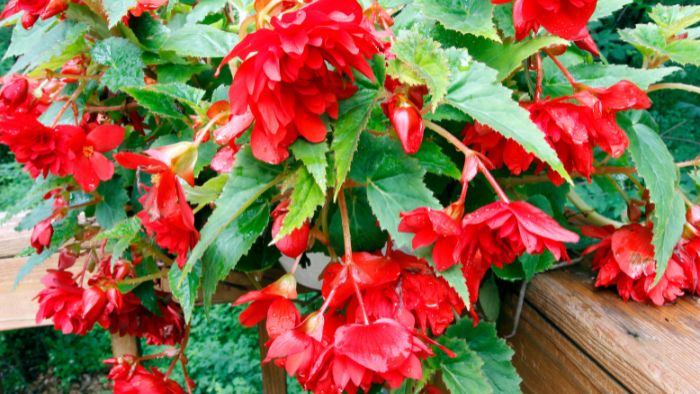The Perfect Soil Mix for Lush and Happy Begonias
Begonias are some of the most beautiful flowering plants that can make any room or garden look better. Begonias are very beautiful and interesting because they come in so many different colors, shapes, and sizes. There are big, bold rex begonias with metallic leaves and tiny, flowering carpet varieties. However, if you want your begonias to do well and thrive, you need to find the right potting soil mix. Let’s talk about the best soil properties and ingredients for making your own soils that are perfect for your begonias and their growing conditions.
Important: Good drainage is by far the most important thing for begonia potting mixes. If you leave begonia roots in heavy, wet soil for too long, they will rot. Adding amendments like perlite, bark chips, coco coir, horticultural charcoal, or anything else light helps create air pockets that keep the soil from getting too wet. As much water as possible should be able to flow through the mix.
Retain Just Enough Moisture
At the same time, begonias don’t like to dry out completely. Ingredients like peat moss, coco coir, compost, or milled sphagnum moss help the soil retain just enough moisture between waterings. The mix should feel lightly damp but never soggy wet.
Not Too Acidic: Most begonias do best in soil that is slightly acidic, with a pH between 5 and 8. 5-6. 5. This pH range makes nutrients more available and keeps root rot at bay even more. Add things like peat moss, composted oak leaves, pine needles, or old bark to the soil to make it more acidic.
Moderate NutritionWhile begonias appreciate nutrients, they are generally light to moderate feeders. A balanced organic slow-release fertilizer mixed into the soil gives them a steady diet without risk of nutrient burn.
Maximize AerationAir circulation is vital for begonia roots. Blending in perlite pumice or other airy additions creates plenty of air pockets for healthy oxygen exchange.
Outdoor Begonia Mixes
For growing begonias in garden beds or pots outdoors, focus on free-draining, lightweight blends. Here are two sample mixes to try:
-
1 part peat moss or coco coir
-
1 part perlite or vermiculite
-
1 part compost, leaf mold, or aged pine bark
-
1 part coco coir or peat
-
1 part perlite
-
1 part orchid bark or horticultural charcoal
-
1 part compost or worm castings
Feel free to adjust proportions to achieve your target texture and drainage speed.
Indoor Begonia Mixes
Indoor begonias appreciate extra moisture retention. Aim for blends like:
-
2 parts peat moss or coco coir
-
1 part perlite or vermiculite
-
1 part compost or worm castings
-
2 parts coco coir
-
1 part perlite
-
1 part orchid bark
-
1 part worm castings
-
1 teaspoon organic slow-release fertilizer per gallon of mix
The extra coco coir and castings help retain water while the added fertilizer provides gentle nutrients.
Plant pot Try a blend like:
- 2 parts peat moss or coco coir
- 1 part fine orchid bark or horticultural charcoal
- 1 part milled sphagnum moss
- 1 teaspoon time-release fertilizer per gallon of mix
The sphagnum moss and charcoal retain moisture without compacting while the fertilizer feeds plants in the confined space.
Get Creative with Your Own Mixes!
The mixes here are just starting points for crafting your own custom begonia soils. Experiment with different amendments and proportions to find your plants’ happy place. The key is nailing that balance of drainage and moisture retention. Tweak your mix based on your specific begonias’ needs and watch them thrive!
With a properly tailored soil foundation, your begonias will flourish and brighten your indoor and outdoor spaces with their fantastic flowers and colors. Don’t be afraid to channel your inner mad scientist conjuring up the perfect potting mix. Your begonias will reward you with their lush, vibrant beauty.

Identifying and Resolving Unhealthy Soil
Mold growth, a foul odor, or excessive moisture are tell-tale signs that your Tuberous Begonias soil has gone rogue. These symptoms can throttle flowering and leave your plant gasping for breath.
Proportions and Considerations
- Peat Moss: Use about 50-60% of your total mix. It’s the base that keeps the roots of your begonias moist and cozy.
- Perlite: Aim for 25-30%. This isn’t just empty words; it’s important for keeping the soil loose and root health.
- Organic Matter: The rest should be your compost or worm castings that have broken down well. This stuff is gold; it gives your begonias a lot of good nutrients.
Begonia Rex Care Tips | 9 Things You Should Know!
FAQ
What is the best soil mixture for begonias?
Begonias will grow in any good soil that drains well. For potting, use a mixture of approximately four part well-decayed leaf mold, one part garden loam, and one part coarse sand.
What is the secret to growing begonias?
In partial sun and ideal temperature conditions, begonias bloom for up to six months. Fertilize regularly with a high-phosphorus plant food to ensure blooming. Apr 15, 2025.
Is Miracle Grow potting soil good for begonias?
Begonias grow best in a light well-draining potting mix. Wendy top dresses each pot with a fresh layer. Any good quality light potting mix will work well. We use one from Miracle-Gro, which can be used for both indoor and outdoor container plants.
Can I use orchid potting mix for begonias?
A Note About Begonia Potting Mix. Try two parts Organic Potting Mix, one part Special Orchid Potting Mix, and one part Wiggle Worm. Begonias especially appreciate the earthworm castings. Castings are full of Nitrogen, and Begonias love to feed.
